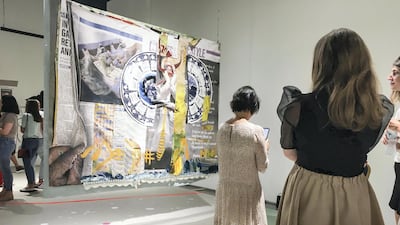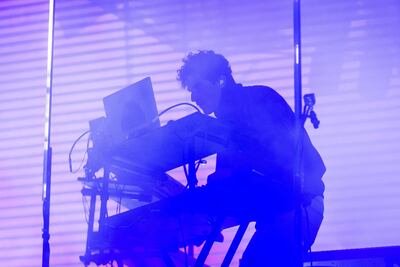On Monday afternoon, I drove with some friends to Mleiha Fort, an archaeological site about 50 kilometres east of the city of Sharjah. We were there to see Nicolas Jaar attempt to capture the sounds of sand. The Chilean composer had buried 16 speakers in the earth and was playing a range of notes through a laptop, which created strange rumblings and vibrations beneath our feet. Proper underground music, if you like. Jaar's performance was part of the first Sharjah Architecture Triennial, which concluded its opening programme this week with a performance by South African pianist Abdullah Ibrahim.
The next morning, we were at Dubai Festival City for the launch of the Emirates Airline Festival of Literature, where it was announced that award-winning novelists Tayari Jones, Jokha Alharthi and Esi Edugyan will be among the headline speakers at the February event. One of the first accounts on Twitter to congratulate the organisers on a cracking line-up was that of the Hay Festival, which is bringing its own literary event to the UAE, also in February.

I won’t continue to regurgitate my diary onto the page. I simply wanted to illustrate how vibrant and diverse the cultural landscape has become here. As Bill Bragin, artistic director of the Arts Centre at NYU Abu Dhabi, pointed out the other day on Twitter, it was immensely encouraging that a dance show in Abu Dhabi was sold out on the same day that the Sharjah International Book Fair got underway. This was, Bragin wrote, “one of the signs of an increasingly robust arts ecosystem in the UAE”.
There are examples of it everywhere. On Monday, Alserkal Avenue in Dubai will stay open late, allowing people to explore the myriad contemporary art exhibitions (last chance to see Is This Tomorrow?, an interesting collaboration between Alserkal Arts Foundation and London's Whitechapel Gallery). On Thursday, Abu Dhabi Art opens. A bracing winter season at Dubai Opera, featuring The Nutcracker and Handel's Messiah, is followed in the new year by Abu Dhabi Classics, headlined by Lebanese singer Majida El Roumi. And in March, Art Dubai will be back.
The other emirates are pulling their weight, too. The Ras Al Khaimah Fine Arts Festival, for example, will celebrate its eighth year in February with large-scale art and sculpture exhibitions, outdoor film screenings and workshops.
It is important, however, that the blossoming of the arts scene in the UAE synchronises with a greater appreciation of the need for criticism – by which I mean honest evaluation, both positive and negative. A robust ecosystem needs to be judged by robust standards. There are three reasons for this. The first is that, with more options available to them, the public deserves an objective appraisal of what is happening in their cities. Tickets are often expensive. A family of four may only be able to afford to attend one show every six months. People should have as much information as possible available to them before they are asked to part with their money. Newspapers and magazines have a responsibility to provide this insight.
Secondly, one of the great joys of the arts is the conversations it provokes. Disagreement about the meaning and merits of, say, a piece of music or theatre, forces us to look at the world from a perspective other than our own (which is exactly what good art should do as well).
I remember having a long chat over a cup of coffee with a friend about a show at NYU Abu Dhabi called Gatz. He was excited by it; I found it tedious and over eager. We argued and argued – and never got close to reaching a consensus. But that's fine. That's exactly how it should be. We should not be passive participants. Art is invigorated when we interact with it.
My colleague at The National, Melissa Gronlund, wrote last year about the need for stronger art criticism in this country. The problem, she pointed out, is that critical analysis is still quite rare here. When it does happen, therefore, it takes people by surprise. This needs to stop. Her article was aimed at professional critics but the point extends to anyone who takes an interest in the arts. Applauding someone's creative endeavour must not be our default position. Interrogation comes first. As the arts scene grows here, our response to it also needs to evolve.
Finally, criticism of the arts inevitably raises standards. The more feedback creatives receive, the greater their output will become. With so much happening across the arts in the UAE, the fight to be noticed is going to get fiercer. This should encourage creative people and curators to take risks. And that's when spectacular things can happen.
There will be hits and misses and each of us has a responsibility not to shy away from highlighting the latter. But I have every confidence that, as more and more artists from here and abroad show off their ideas across the UAE, soon the word “robust” will no longer be adequate to describe the arts ecosystem. You will need a much stronger adjective than that.
It is all tremendously exciting – just don’t forget that you have a role to play, too.



